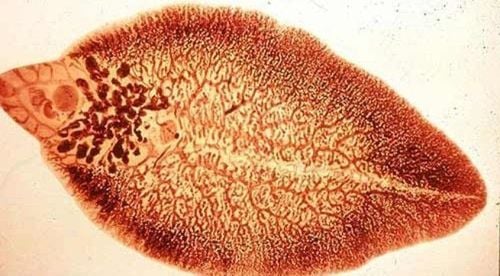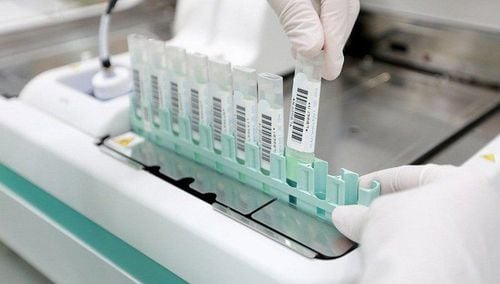This is an automatically translated article.
The article is professionally consulted by Master, Doctor Tran Thi Vuong - Doctor of Microbiology - Laboratory Department - Vinmec Hai Phong International General HospitalWith the method of testing Clonorchis sinensis IgG to find small liver flukes in the blood by Elisa immunological method, it will give high sensitivity and specificity, about 85 - 98%. Because when testing for Clonorchis sinensis IgG, IgG antibodies appear later and persist for a long time, so it can be a suggestion of a chronic infection.
1. What is fascioliasis?
Liver fluke is a parasite in the body of humans and animals. The number of liver fluke parasites in the bile ducts can be in the tens, hundreds or even thousands.
Small liver flukes cause severe damage to the liver. Flukes not only cause frequent irritation to the liver, but also take up food and cause toxicity. The fluke parasites in the bile ducts, clinging tightly with the mouth to take up food, causing inflammation of the bile ducts and due to this long-term harmful nature, leading to cases of diffuse fibrosis in the portal spaces in the liver, the nest The liver function is proliferated and can lead to liver fibrosis, ascites, and fatty degeneration of the liver.
In terms of symptoms, fascioliasis depends on the intensity of infection and host response. In rare cases, there are sometimes no special symptoms. With cases of infection with more than 100 flukes, symptoms appear clearly.
Initiation phase: At this stage, often the patient feels anorexia, bloating due to indigestion, dull pain in the liver, diarrhea or may also have erratic constipation. There are signs of rash all over the body, accompanied by rashes, sudden elevation of eosinophils. Full-blown stage: At this stage, the patient presents with liver pain accompanied by anemia. Later, the patient was emaciated, edematous, sometimes erratic. Some symptoms such as jaundice, ascites may appear at a later time and be accompanied by intermittent or prolonged fever due to bacterial superinfection.
2. Clonorchis sinensis IgG test for small liver flukes
With the Clonorchis sinensis IgG test method to find small liver flukes in the blood by Elisa immunological method, it has high sensitivity and specificity, ranging from 85 to 98%. Specifically, when testing for Clonorchis sinensis IgG, IgG antibodies appear later and persist for a long time, so it can be a hint of chronic infection.
Besides, when the small liver fluke invades the liver parenchyma and secretes substances, IgG and IgE antibodies will appear in about 14 days, so the test will give positive results.
Thus, a single negative Clonorchis sinensis IgG test means that the patient has never had fascioliasis in the past. If Clonorchis sinensis IgG alone is positive, there are two possibilities: one is that the patient has had a small liver fluke in the past, but the amount of IgG antibodies is still present, the other is that this time the patient is infected. small liver fluke. In case of diagnosis of small liver fluke infection, other tests should be done (presented below)

3. Other diagnostic tests for fascioliasis
In addition to the Clonorchis sinensis IgG test, the doctor can prescribe the following small liver fluke testing methods to diagnose:Faecal smear technique to identify fluke eggs: This is a diagnostic technique for small liver flukes that is easy to perform. and is widely used in medical facilities. Stool samples will be taken consecutively for at least 3 days in order to find the eggs with the highest probability. However, fecal examination for eggs is a simple method and is considered the gold standard for diagnosis. However, the fecal examination for eggs should be based on the reproductive cycle of the fluke, the elimination of eggs through the stool as well as the preservation time of stool samples not exceeding 4 hours, ... Scan duodenum or bile. : This technique can also find eggs and adult flukes, however, only in cases of low infection, no eggs can be found in the stool, then this diagnostic technique should be used. Testing for Clonorchis sinensis IgM, IgM antibodies appear soon after the small liver fluke invades and causes disease, which can be a suggestion for an acute infection. Complete blood count test: This is an aid in the diagnosis of small liver flukes. If the eosinophils are elevated by 25-25%, it may be a sign of fascioliasis. Serum IgE levels may be elevated. Imaging tests such as cholangiography, ultrasound, and liver computed tomography to further aid in the diagnosis.
4. How to prevent liver fluke disease
Liver fluke disease in general is a dangerous disease, easily causing complications or more dangerous, leading to cancer of the organs where they are parasitic, from which there is a high risk of affecting the patient's life. Therefore, each person needs to be aware of liver fluke disease right from the beginning. Methods of disease prevention include:Follow the method of eating cooked, drinking boiling water, washing hands before eating as well as carefully preparing foods. After using the toilet, coming into contact with feces or having contact with garbage, remember to wash your hands thoroughly with soap under running water many times. Use clean water for drinking and daily living; Do not eat fish, snails or vegetables that grow under water that have not been processed and cooked thoroughly. Deworming every 6 months. Manage human and animal manure properly, do not use fresh manure to water vegetables. As an infectious disease through the gastrointestinal tract, small liver fluke disease, if not detected early and treated promptly, will seriously affect the health of the patient. Therefore, as soon as signs and symptoms of the disease appear, people need to go to medical centers for timely examination and treatment.
Currently, Vinmec International General Hospital is one of the leading prestigious hospitals in the country, trusted by a large number of patients for medical examination and treatment. Not only has a system of modern facilities and equipment: 6 ultrasound rooms, 4 DR X-ray rooms (1 full-axis scanner, 1 brightener, 1 synthesizer and 1 mammogram machine). ), 2 DR mobile X-ray machines, 2 multi-row CT scanner rooms (1 128 rows and 1 16 arrays), 2 Magnetic resonance imaging rooms (1 3 Tesla and 1 1.5 Tesla) , 1 room for 2 level interventional angiography and 1 room for measuring bone mineral density... Vinmec is also the place to gather a team of experienced doctors and doctors who will greatly assist in diagnosis and detection. early signs of abnormality in the patient's body. In particular, with a space designed according to 5-star hotel standards, Vinmec ensures to bring the patient the most comfort, friendliness and peace of mind.
Please dial HOTLINE for more information or register for an appointment HERE. Download MyVinmec app to make appointments faster and to manage your bookings easily.














